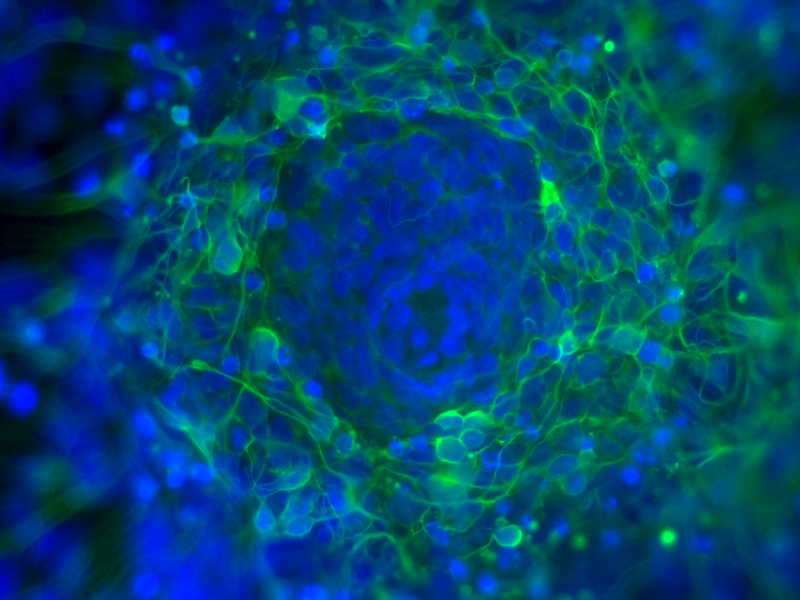
Allison D. Ebert, PhD
Professor; Director, Neuroscience Research Center; Director, Neuroscience Doctoral Program
Locations
- Cell Biology, Neurobiology and Anatomy
Contact Information
Education
BS, Indiana University, Bloomington, IN 1999
Research Areas of Interest
- Alzheimer Disease
- Amyotrophic Lateral Sclerosis
- Astrocytes
- Cell Survival
- Cytomegalovirus
- Induced Pluripotent Stem Cells
- Microglia
- Motor Neurons
- Muscular Atrophy, Spinal
- Neurodegenerative Diseases
- Organoids
- Stem Cell Transplantation
Research Interests
Therapeutic uses of stem cells and disease modeling for spinal muscular atrophy, amyotrophic lateral sclerosis, and congenital HCMV infection
 My research interests are in the area of neurodegenerative diseases, both understanding the molecular basis for the disease progression and finding effective experimental therapies. My current research focuses on using induced pluripotent stem cells (iPSCs) derived from patient tissue to understand disease mechanisms and therapeutic intervention. Ongoing projects in my lab are investigating motor neuron malfunction and loss involved in spinal muscular atrophy (SMA) and amyotrophic lateral sclerosis (ALS). We are using iPSCs derived from SMA and ALS patients to generate motor neurons, astrocytes, and microglia to determine mechanisms contributing to disease pathology. My lab has found that SMA astrocytes aberrantly upregulate a transcriptional network that increases neuroinflammation and that they have altered cell surface proteins that disrupt synapses. In ALS we have found that microglia and astrocytes together play a role in the accumulation of aggregated proteins and motor neuron loss. My lab then uses in vitro and in vivo gene therapy approaches to modulate astrocyte and microglial malfunction to improve motor neuron health and survival. Finally, we are investigating the cellular, molecular, and functional consequences of viral infection on brain development and neurodegeneration. Specifically, we use iPSC-derived neural progenitor cells, neurons, microglia, and cortical organoids to determine how infection with human cytomegalovirus alters neurodevelopment and test the impact of antiviral strategies.
My research interests are in the area of neurodegenerative diseases, both understanding the molecular basis for the disease progression and finding effective experimental therapies. My current research focuses on using induced pluripotent stem cells (iPSCs) derived from patient tissue to understand disease mechanisms and therapeutic intervention. Ongoing projects in my lab are investigating motor neuron malfunction and loss involved in spinal muscular atrophy (SMA) and amyotrophic lateral sclerosis (ALS). We are using iPSCs derived from SMA and ALS patients to generate motor neurons, astrocytes, and microglia to determine mechanisms contributing to disease pathology. My lab has found that SMA astrocytes aberrantly upregulate a transcriptional network that increases neuroinflammation and that they have altered cell surface proteins that disrupt synapses. In ALS we have found that microglia and astrocytes together play a role in the accumulation of aggregated proteins and motor neuron loss. My lab then uses in vitro and in vivo gene therapy approaches to modulate astrocyte and microglial malfunction to improve motor neuron health and survival. Finally, we are investigating the cellular, molecular, and functional consequences of viral infection on brain development and neurodegeneration. Specifically, we use iPSC-derived neural progenitor cells, neurons, microglia, and cortical organoids to determine how infection with human cytomegalovirus alters neurodevelopment and test the impact of antiviral strategies.
Publications
-
(Adelman JW, Sukowaty AT, Partridge KJ, Gawrys JE, Akins A, Terhune SS, Ebert AD.) Microbiol Spectr. 2025 Nov 04;13(11):e0119825 PMID: 41059695 PMCID: PMC12584624 SCOPUS ID: 2-s2.0-105020947428 10/08/2025
-
IL-1ra and CCL5, but not IL-10, are promising targets for treating SMA astrocyte-driven pathology.
(Allison RL, Mangione CC, Suneja M, Gawrys J, Melvin BM, Belous N, LaCroix M, Harmelink M, Burnett BG, Ebert AD.) Mol Ther. 2025 Feb 05;33(2):734-751 PMID: 39673131 PMCID: PMC11853362 SCOPUS ID: 2-s2.0-85212823626 12/14/2024
-
(Slick RA, Sutton J, Haberman M, O'Brien BS, Tinklenberg JA, Mardikar A, Prom MJ, Beatka M, Gartz M, Vanden Avond MA, Siebers E, Mack DL, Gonzalez JP, Ebert AD, Nagaraju K, Lawlor MW.) Biol Open. 2024 Sep 15;13(9) PMID: 39158383 PMCID: PMC11391821 SCOPUS ID: 2-s2.0-85204886608 08/19/2024
-
(Adelman JW, Sukowaty AT, Partridge KJ, Gawrys JE, Terhune SS, Ebert AD.) bioRxiv. 2024 Aug 19 PMID: 39229072 PMCID: PMC11370344 09/04/2024
-
(Allison RL, Welby E, Ehlers V, Burand A, Isaeva O, Nieves Torres D, Highland J, Brandow AM, Stucky CL, Ebert AD.) Blood. 2024 May 16;143(20):2037-2052 PMID: 38427938 PMCID: PMC11143522 SCOPUS ID: 2-s2.0-85189689054 03/01/2024
-
(Allison RL, Ebert AD.) Hum Mol Genet. 2024 Feb 28;33(6):530-542 PMID: 38129120 SCOPUS ID: 2-s2.0-85186709230 12/22/2023
-
(Adelman JW, Rosas-Rogers S, Schumacher ML, Mokry RL, Terhune SS, Ebert AD.) mBio. 2023 Dec 19;14(6):e0225123 PMID: 37966250 PMCID: PMC10746155 SCOPUS ID: 2-s2.0-85183165409 11/15/2023
-
(Miller N, Xu Z, Quinlan KA, Ji A, McGivern JV, Feng Z, Shi H, Ko CP, Tsai LH, Heckman CJ, Ebert AD, Ma YC.) Proc Natl Acad Sci U S A. 2023 Nov 21;120(47):e2300308120 PMID: 37976261 PMCID: PMC10666147 SCOPUS ID: 2-s2.0-85177422314 11/17/2023
-
(O'Brien BS, Mokry RL, Schumacher ML, Rosas-Rogers S, Terhune SS, Ebert AD.) J Virol. 2023 Oct 31;97(10):e0069623 PMID: 37796129 PMCID: PMC10653813 SCOPUS ID: 2-s2.0-85175819477 10/05/2023
-
(Kim JK, Jha NN, Awano T, Caine C, Gollapalli K, Welby E, Kim SS, Fuentes-Moliz A, Wang X, Feng Z, Sera F, Takeda T, Homma S, Ko CP, Tabares L, Ebert AD, Rich MM, Monani UR.) Neuron. 2023 May 03;111(9):1423-1439.e4 PMID: 36863345 PMCID: PMC10164130 SCOPUS ID: 2-s2.0-85150290633 03/03/2023
-
(Adelman JW, Rosas-Rogers S, Schumacher ML, Mokry RL, Terhune SS, Ebert AD.) bioRxiv. 2023 Mar 06 PMID: 36945635 PMCID: PMC10028818 03/23/2023
-
(Luecke IW, Lin G, Santarriaga S, Scaglione KM, Ebert AD.) Gene Therapy. June 2023;30(6):528-533 SCOPUS ID: 2-s2.0-85109959996 06/01/2023
Ebert Lab
Lab alumni
Jered McGivern, PhD, Assistant Professor, Department of Biochemistry, Lakeland College, Sheboygan, WI
Teresa Patitucci, PhD, Assistant Professor in Cell Biology, Neurobiology & Anatomy, Medical College of Wisconsin
Andrew Schwab, PhD, Study Director at Metabolon, Inc, Raleigh-Durham, North Carolina
Emily Seminary, PhD, Associate Medical Writing Document Manager, Astellas Pharma US, Chicago, IL


